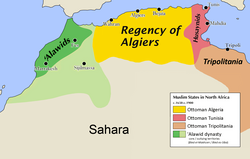
Back إيالة الجزائر Arabic Rexencia d'Arxel AST Osmanlı Əlcəzairi Azerbaijani Regència d'Alger Catalan Osmanský Alžír Czech Regentschaft Algier German Cezayirê Ğerbi (eyalet) DIQ Εγιαλέτι του Αλγερίου Greek Regencia de Argel Spanish الجزایر عثمانی Persian
This article or section is in a state of significant expansion or restructuring. You are welcome to assist in its construction by editing it as well. This template was placed by Tenryuu (talk · contribs). If this article or section has not been edited in several days, please remove this template. If you are the editor who added this template and you are actively editing, please be sure to replace this template with {{in use}} during the active editing session. Click on the link for template parameters to use.
This article was last edited by [[User:|]] ([[User talk:|talk]] | contribs) 0 seconds ago. (Update timer) |
Regency of Algiers | |
|---|---|
| 1516–1830 | |
| Motto: دار الجهاد | |
| Coat of arms of Algiers (1516–1830) | |
 Overall extent of the Regency of Algiers, late 17th to early 19th centuries[5] | |
| Status | Autonomous eyalet (Client state) of the Ottoman Empire[6][7] De facto independent since mid-17th century[8][9][10] |
| Capital | Algiers |
| Official languages | Ottoman Turkish and Arabic (since 1671)[11] |
| Common languages | Algerian Arabic Berber Sabir (used in trade) |
| Religion | Official, and majority: Sunni Islam (Maliki and Hanafi) Minorities: Ibadi Islam Shia Islam Judaism Christianity |
| Demonym(s) | Algerian or Algerine (obs.) |
| Government | Stratocratic Regency 1516–1519: Sultanate 1519–1659: Pashalik 1659[12] (de facto in 1626)[13]–1830: Military republic |
| Rulers | |
• 1516–1518 | Aruj Barbarossa |
• 1710–1718 | Baba Ali Chaouch |
• 1766-1791 | Baba Mohammed ben-Osman |
• 1818–1830 | Hussein Dey |
| Historical era | Early modern period |
| 1509 | |
| 1516 | |
| 1521–1791 | |
| 1541 | |
| 1550–1795 | |
| 1580–1640 | |
| 1627 | |
| 1659 | |
| 1681–1688 | |
| 1699–1702 | |
| 1775–1785 | |
| 1785–1816 | |
| 1830 | |
| Population | |
• 1830 | 3,000,000–5,000,000 |
| Currency | Major coins: mahboub (sultani) budju aspre Minor coins: saïme pataque-chique |
| Today part of | Algeria |
| History of Algeria |
|---|
 |
The Regency of Algiers[a][b] was an early modern semi-independent Ottoman province and tributary state on the Barbary Coast of North Africa from 1516 to 1830.[c] Founded by the privateer brothers Aruj and Hayreddin Reis (also known as the Barbarossa brothers), the Regency succeeded the Kingdom of Tlemcen as an infamous and formidable pirate base that plundered and waged maritime holy war on European Christian powers. Ottoman regents ruled as heads of a stratocracy—an autonomous military government controlled by the janissary corps—known as Garp ocakları (lit. 'Western Garrison') in Ottoman terminology.
The Regency emerged in the 16th-century Ottoman–Habsburg wars as a unique corsair state that drew revenue and political power from its maritime strength. In the 17th century, when the wars between the Spanish Habsburgs and the Ottoman Empire, Kingdom of France, Kingdom of England and Dutch Republic ended, Barbary corsairs started capturing merchant ships and their crews and goods from these states. When the Ottomans could not prevent these attacks, European powers negotiated directly with Algiers and also took military action against it. This emancipated Algiers diplomatically and increased its autonomy.
The Regency held significant naval power in the 16th and 17th centuries and well into the end of the Napoleonic wars despite European naval superiority. Its institutionalised privateering dealt substantial damage to European shipping, took captives for ransom, plundered booty, hijacked ships and eventually demanded regular tribute payments. In the rich and bustling city of Algiers, the Barbary slave trade reached an apex. After the janissary coup of 1659, the Regency became a sovereign military republic,[d] and its rulers were thenceforth elected by the council known as the diwan rather than appointed by the Ottoman sultan previously.
Despite wars over territory with Spain and the Maghrebi states in the 18th century, Mediterranean trade and diplomatic relations with European states expanded. Bureaucratisation efforts stabilized the Regency's government, allowing into office regents such as Mohammed ben-Osman, who maintained Algerian prestige thanks to his public and defensive works which increased revenue and fended off attacks on Algiers. British tribute payments no longer insured U.S. shipping traffic in the Mediterranean after the American Revolution, and the French Revolutionary and Napoleonic wars provided an opportunity for frequent Algerian privateering. Increased demands for tribute from Algiers started the Barbary Wars at the beginning of the 19th century, when Algiers was decisively defeated for the first time. Internal central authority weakened in Algiers due to political intrigue, failed harvests and the decline of privateering. Violent tribal revolts followed, mainly led by maraboutic orders such as the Darqawis and Tijanis. In 1830, France took advantage of this domestic turmoil to invade. The resulting French conquest of Algeria led to colonial rule until 1962.
- ^ Agoston 2009, p. 33.
- ^ Cathcart & Newkirk 1899, p. 94
- ^ Merouche 2007, p. 140.
- ^ Panzac 2005, p. 22.
- ^ Sluglett 2014, p. 68.
- ^ Somel 2010, p. 16.
- ^ McDougall 2017, p. 37,45.
- ^ Naylor 2015, p. 121.
- ^ Ruedy 2005, p. 19.
- ^ Saidouni 2009, p. 195.
- ^ Al-Jilali 1994, p. 187.
- ^ McDougall 2017, p. 38.
- ^ Merouche 2007, p. 186.
Cite error: There are <ref group=nb> tags on this page, but the references will not show without a {{reflist|group=nb}} template (see the help page).
Cite error: There are <ref group=lower-alpha> tags or {{efn}} templates on this page, but the references will not show without a {{reflist|group=lower-alpha}} template or {{notelist}} template (see the help page).


